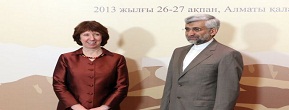US lawmakers to tighten sanctions on Iran amid Tehran-P5+1 talks
 US lawmakers plan to tighten economic sanctions against Tehran over the country’s nuclear program as Iran and the group of six major world powers continue their talks in Kazakhstan.
US lawmakers plan to tighten economic sanctions against Tehran over the country’s nuclear program as Iran and the group of six major world powers continue their talks in Kazakhstan.
Reuters reported that a bill, slated to be introduced in the Congress on Wednesday, would enable US President Barack Obama to “impose financial penalties on foreign companies and entities that provide Iran with goods that are critical to its economy.”
The bill is also designed to force countries like China to buy less Iranian crude oil, according to a copy of the legislation obtained by Reuters on Tuesday.
The measure, that expands current sanctions imposed against Iran, also attempts to cut off the country’s access to hard currencies such as the euro by pressuring EU to block Iran from the European Central Bank's payment system.
In a letter to President of the European Council Herman Van Rompuy on Monday, 36 US senators urged to union to close “a significant loophole in US-EU sanctions policy” in order to increase pressures against Iran.
“We strongly urge you to take all the necessary measures to cut off Iran’s ability to use its foreign-held euros,” the Financial Times quoted the letter as saying.
The measures come as Iran and the P5+1 (Britain, China, France, Russia, and the United States plus Germany) started the second day of the latest round of negotiations in southeastern Kazakh city of Almaty on Wednesday.
Iran and the P5+1 group have held several rounds of talks with the main focus on Iran’s nuclear energy program. The last round of negotiations between Iran and the P5+1 group was held in Moscow in June 2012.
The United States, Israel and some of their allies have repeatedly accused Iran of pursuing non-civilian objectives in its nuclear energy program.
Over the false allegation, Washington and the European Union have imposed several rounds of illegal unilateral sanctions against the Islamic Republic.
Iran refutes the allegation and argues that as a signatory to the nuclear Non-Proliferation Treaty and a member of the International Atomic Energy Agency, it is entitled to develop nuclear technology for peaceful purposes.
Source: PressTV
Add new comment